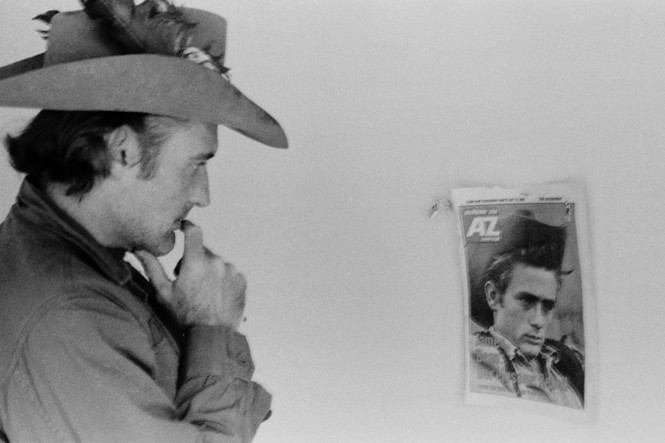
American idylls have unusual roots, and so it’s no great surprise to consider that the “New Hollywood” that found its full flourish in the early 1970s had origins all the way back in 1961 with the improbable union of two artists who met and married that year. To understand the last great period of widespread creative freedom in mainstream American cinema, a period in which the movies offered not just ambiguity and complexity but an almost infinite sense of possibility resounding through the culture at large, we might look to the turbulent story of this couple, whose own artistic capacities might have seemed, for a moment, likewise without limit.
Brooke Hayward was a blue blood: The daughter of a debonair talent agent and the actor Margaret Sullavan, she’d grown up in Connecticut and Brentwood, California. Dennis Hopper was, well, Dennis Hopper: the child of an unusually progressive family in Dodge City, Kansas, who’d instilled in him both liberal values and no small amount of neurosis. Both were young actors, students of Lee Strasberg, the great teacher of Method acting, when they met in New York City, cast together in a play called Mandingo. Brooke loathed Dennis, Dennis fell in love, and—once Brooke came around—one of the more colorful and consequential alliances of the ’60s was born.
This is the story Mark Rozzo’s Everybody Thought We Were Crazy: Dennis Hopper, Brooke Hayward, and 1960s Los Angeles presents, in terms that are mostly gripping. It is a tale driven more by encounter than incident: Hopper and Hayward collide herein with just about every major cultural personage of the American mid-century—including Miles Davis, Andy Warhol, Martin Luther King Jr., David O. Selznick. The trajectory of their marriage itself, by contrast, is less meandering than a straight line from youthful, if uneasy, semi-bliss to abusive, drug-stoked disaster in one long stride. If you want narrative complication, look elsewhere, but if you want a vibrant depiction of how some of the most substantial creative figures of the 20th century jostled against and inspired one another? Look here. What makes Rozzo’s book exciting is not just the collective artistic firepower of the various names involved, but the many surprising ways in which these names interact, and the ways in which these interactions occasionally give rise to significant cultural events.
[Read: A film in pursuit of Dennis Hopper’s true self]
Rozzo wisely begins his telling with what might be its most stirring dramatic episode: It’s 1961. Hayward and Hopper are young newlyweds, freshly settled in Bel Air, when the canyon their house is situated in catches fire (nearly 500 homes, including Zsa Zsa Gabor’s and Aldous Huxley’s, would be destroyed). The couple, along with Hayward’s two children from a previous marriage, are forced to relocate, and everything they own is gone. They must start again, and that starting again—together they buy a home at 1712 N. Crescent Heights Boulevard and fill it with contemporary art, and contemporary people—makes up the story of Rozzo’s book.
Hayward is a promising young actor at this point, freshly launched on her Hollywood career with a feature called Mad Dog Coll, and Hopper is a former protégé of James Dean’s (the two had appeared together in both Giant and Rebel Without a Cause) who has already exhausted the patience of the mighty Hollywood powers. (Most famously, he’d colorfully told off Columbia Pictures’ Harry Cohn in a meeting that might otherwise have landed him a starring role opposite Kim Novak in 1955.) Now he’s at once a has-been and a wannabe: a painter, a photographer who will soon latch on to his dream of directing a movie, but for now is scraping out a living doing bit parts on television shows such as 87th Precinct. As Joanne Woodward put it when she accompanied him to the Giant premiere: “Dennis is a genius. I’m not sure of what, and I’m not sure if Dennis knows of what.”

The cracks are there from the start: Hopper has a habit of disappearing (domestic routine might not be his thing), and is on an unknown bender, possibly in Tijuana, just before the fire hits. Hayward’s parents couldn’t stand him, and she’s already homesick for New York. Yet somehow, the marriage endures. Rozzo sketches with great sensitivity the complex childhood of both: Dennis’s relationship with his father (“a decent guy,” in Dennis’s telling; a “son-of-a-bitch” according to his brother, David) and mother, on whom he’d develop a truly bizarre psychosexual fixation. Hayward grew up on another planet, with tutors and nannies and a private barn for a playroom, with Hollywood royalty (Scharys, Selznicks, and Fondas) surrounding her, but with a similar sense of neglect.
Hayward and Hopper are united, thus, by loneliness and rebellion: the two things that spark most artists, I suspect, and the two that, not at all coincidentally, will soon be so remarkably expressed within the movies of the New Hollywood themselves in idiosyncratic masterpieces such as Taxi Driver and Chinatown. What happens once the couple moves into 1712 is that Dennis begins to collect. He collects friendships (with the gallerist Irving Blum and the artists he represents: Ed Kienholz, Ed Ruscha, Billy Al Bengston); he collects art (he may have been the first purchaser of one of Andy Warhol’s fabled Campbell’s-soup-can paintings); and he collects restlessness the way a bucket might collect rainwater. Movies are the real world in Dennis’s lexicon, and as his dream of directing slips further away, he suffers accordingly. Eventually he meets Peter Fonda, the brother of Brooke’s closest childhood friend, Jane, and out of that, Easy Rider, the face that launched a thousand ships—Dennis’s directorial debut—will be born.
Rozzo weights his book—necessarily so—toward Hopper: Hayward quits acting when he gets jealous during her shooting of a TV series called The Rogues in 1964, and so her thespian promise goes unrealized, while most of the encounters that drive the book (with Kienholz, with Warhol, with Bob Dylan and the Byrds) are Hopper’s. These encounters are thrilling (the discovery of the Byrds, and Rozzo’s descriptions of their vertiginous, druggy, and erotic allure suddenly lighting up the Sunset Strip, are particularly so), and go a ways toward balancing the story’s grimmer aspect: the horrendous decline of the marriage as Hopper (“erratic,” let’s say, at the beginning) conducts his full-blown slide into alcohol- and drug-fed mania, finally arriving at scenes of abuse that are as awful and frightening as you can imagine.
[Read: Quentin Tarantino has made his best movie in a decade]
To wish for a different ending—to wish that Hayward’s 1960s had been as productive and ultimately triumphant as Hopper’s (though she would find her creative apotheosis in her remarkable 1977 memoir, Haywire, a book that is at once tumultuous, radiant, and tragic)—is precisely the point, although Rozzo doesn’t belabor it. Instead he finds his way to an unexpectedly elegiac conclusion, one that echoes a phrase Fonda uses in one of his letters to Hopper (and that Hopper would later use for his performance in 1979’s Apocalypse Now): “dreaming down the road of possibility, where ‘If’ is the middle-word of L-I-F-E.”

The triumph of Rozzo’s book is that one ultimately feels this sense of possibility at its full extension. The mother lode of anecdote and gossip these pages contain (did you know that Miles Davis coined the title of his landmark recording “So What” during a boxing match with Hopper? I did not) is one reason to enjoy them. Another, perhaps more substantial, one is to feel all this potential before it evaporates, and before this improbable, fleetingly beautiful union—just like that period of promise that would occur for the movies merely a year or two later; that electric moment in which they told the truth about America, and about themselves—goes shooting down in flames.






